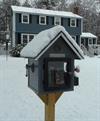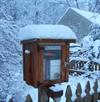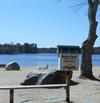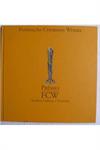Winter World
Registered by  GoryDetails
GoryDetails of Nashua, New Hampshire USA on 1/22/2023
of Nashua, New Hampshire USA on 1/22/2023
 This Book is Currently in the Wild!
This Book is Currently in the Wild!
 GoryDetails
GoryDetails of Nashua, New Hampshire USA on 1/22/2023
of Nashua, New Hampshire USA on 1/22/2023 This Book is Currently in the Wild!
This Book is Currently in the Wild!
1 journaler for this copy...
 I found this softcover in this Little Free Library in Tewksbury MA while dropping off some books of my own, and nabbed it for another release copy. (I originally chose the book for the adorable cover-art, but the contents are well worth reading.)
I found this softcover in this Little Free Library in Tewksbury MA while dropping off some books of my own, and nabbed it for another release copy. (I originally chose the book for the adorable cover-art, but the contents are well worth reading.) The book's full of fascinating facts, if a bit dry. It does reveal why I'm not a naturalist, among other things; it would never have occurred to me, upon seeing a road-killed chipmunk, to stuff the corpse's cheek-pouches with seeds to find out for myself how many the creatures could carry! That, and a good many other investigative techniques, illustrate how differently curiosity takes us; I look at small birds in winter and wonder how they survive, but Heinrich spends hours in the woods observing them, climbing trees to see if birds are spending the night in old squirrel nests, probing the little critters with thermometers to find out if they go into torpor at night, even killing some so as to measure body fat and examine stomach contents to see what they eat in winter. [I don't think I was ever that curious - although, having read the book, I'm looking at all the local winter wildlife with new eyes!]
From bees to birds to bears, Heinrich describes his own observations and the experiments done by others, revealing a wide variety of techniques for surviving harsh conditions. I knew that bears hibernated, but I hadn't realized - or hadn't thought about - how remarkable it is that so large a creature can remain immobile for months, without eating, drinking, or relieving itself, and wake in the spring with no significant ill effects. Even if a person could survive that long without water and without being poisoned by their own unexpelled wastes, they'd have bedsores and severely weakened muscles and bones after a few months; how do the bears do it?
Some birds survive by going into a state of near-coma overnight - suspended animation, in which they're barely alive. Others huddle together for warmth and do not go into torpor; this costs more energy but allows them to react more quickly to a sudden change of situation. Still others combine tactics as the circumstances warrant - aided by the fact that birds can apparently allow their feet and legs to reach near-freezing temperatures while the rest of them is considerably warmer, without getting frostbite.
There's a chapter on hibernating squirrels; not all squirrels hibernate, but some of those that do seem to need to awake - or nearly awake - at intervals in order to dream! At least, that's the deduction of experimenters who observed a periodic warming up of the animals to the point where REM sleep began.
Some insects can survive being frozen solid at some stages of their development, while at other stages they're more vulnerable; timing is critical... Other creatures [amphibians especially] seem able to create their own antifreeze, allowing themselves to be super-cooled and survive at sub-freezing temperatures without cell damage.
Fascinating stuff, all of it. One thing kept coming to mind, though; many of the studies of everything from wasps to birds to bears included some researchers sneaking up on the subjects and probing them with thermometers. Rectal thermometers. And all I could think of was those reports of alien abductions, and the infamous anal probes... are we being visited by naturalists? {grin}
Journal Entry 2 by  GoryDetails
GoryDetails at LFL [OBCZ] - New Searles Rd, #46 in Nashua, New Hampshire USA on Monday, January 23, 2023
at LFL [OBCZ] - New Searles Rd, #46 in Nashua, New Hampshire USA on Monday, January 23, 2023
 GoryDetails
GoryDetails at LFL [OBCZ] - New Searles Rd, #46 in Nashua, New Hampshire USA on Monday, January 23, 2023
at LFL [OBCZ] - New Searles Rd, #46 in Nashua, New Hampshire USA on Monday, January 23, 2023
Released 1 yr ago (1/24/2023 UTC) at LFL [OBCZ] - New Searles Rd, #46 in Nashua, New Hampshire USA
WILD RELEASE NOTES:
 I left this book in my Little Free Library on this snowy day; hope someone enjoys it!
I left this book in my Little Free Library on this snowy day; hope someone enjoys it![See other recent releases in NH here.]
I'm reclaiming this from my Little Free Library as it's gone unchosen for a while; will release it elsewhere.
Journal Entry 4 by  GoryDetails
GoryDetails at LFL - Pond St. (72), Heart Pond Beach in Chelmsford, Massachusetts USA on Thursday, March 30, 2023
at LFL - Pond St. (72), Heart Pond Beach in Chelmsford, Massachusetts USA on Thursday, March 30, 2023
 GoryDetails
GoryDetails at LFL - Pond St. (72), Heart Pond Beach in Chelmsford, Massachusetts USA on Thursday, March 30, 2023
at LFL - Pond St. (72), Heart Pond Beach in Chelmsford, Massachusetts USA on Thursday, March 30, 2023
Released 1 yr ago (3/30/2023 UTC) at LFL - Pond St. (72), Heart Pond Beach in Chelmsford, Massachusetts USA
WILD RELEASE NOTES:
 I left this book in the lakeside Little Free Library on this bright, cool day; hope someone enjoys it!
I left this book in the lakeside Little Free Library on this bright, cool day; hope someone enjoys it![See other recent releases in MA here.]
** Released for the 2023 4 Elements challenge. **
** Released for the 2023 Oh, the Places We Can Go challenge. **







